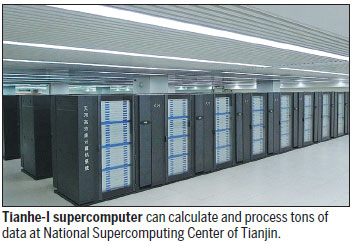
Bringing the latest innovation to market
Binhai New Area in Tianjin has been working hard to ensure that its investments in developing intelligent technologies can be applied and commercialized in the real economy.
The new area is currently accelerating its application of smart technologies on a wider scale, covering public security, education, healthcare, environmental protection, transportation and logistics, according to Binhai representatives, adding they are encouraging traditional industries to transform into digital or intelligent ones.
"In the past, our workers needed to assemble our products by hand before final processing," said a spokesman from furniture manufacturer Markor International Furnishings Co Ltd. "Now, thanks to automation, the whole process can be finished by a robot."
These products are then placed in the warehouse and the staff just scans the orders and then picking starts automatically, he added.
One of the main benefits of intelligent manufacturing is that it lowers the cost of production and that less labor is needed on the production line.
According to the local government, intelligent technology is injecting new vitality into industrial development. Binhai New Area is excelling in this area with 10 key industry indexes in digital, integrated interconnection and intelligent coordination, ranking higher than the national average.
The utilization rate of digital design tools for research and development is 91.5 percent in Binhai New Area, and the numerical control rate of key process is 70.5 percent.
"Focusing on pillar industries in Binhai New Area to solve common problems and bottlenecks that restrict the development of enterprises is our breakthrough point," an official from Tianjin Binhai New Area said.
"We will strengthen enterprise transformation in key areas such as R&D design, production process, equipment, management, energy saving and emission reduction."
As early as 2013, the National Supercomputing Center of Tianjin started the construction of the Tianjin Binhai Industry Cloud Platform, becoming one of the first batch of 16 industrial cloud innovation service pilot projects in China.
Binhai Industry Cloud 2.0 was launched last November. The project, which is based on the technology and resources of the National Supercomputing Center, integrates high performance computing, cloud computing and large big data frameworks.
It provides several core functions, such as industry cloud platforms, industrial archives, basic cloud services, news and information, as well as industrial alliance services.
Covering 10 industry fields, including equipment manufacturing, mold design for the automobile industry, the Industry Cloud 2.0, by integrating resources and creating an intelligent ecological environment, is set to accelerate the pace of transformation and upgrading in the manufacturing industry.
Liu Guangming, director of the National Supercomputing Center in Tianjin, said the Tianjin Binhai Industry Cloud 2.0 has enhanced the R&D capability of foreign-funded enterprises in China.
Danfoss from Europe originally planned to set up an R&D center in India, but decided on Tianjin after understanding the service content of the industrial cloud platform and the National Supercomputing Center, Liu said.
The Binhai Industry Cloud 2.0 also helps domestic enterprises to continue to progress and push traditional enterprises to transform and upgrade.
For example, Tianjin Motor Dies Co has grown into a world leader in automobile paint after cooperating with the National Supercomputing Center, Liu said.
A strong and competitive atmosphere has been fostered in Binhai New Area, allowing companies to specialize in fields such as robotics, automated equipment, big data and speech recognition.
The development of the intelligent economy has become an irreversible trend of economic transformation and development in China and the rest of the world.

(China Daily 05/18/2018 page24)

